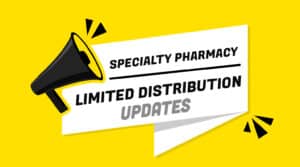We’ve often written about the legal pitfalls that specialty pharmacies may encounter that end up costing them financially (HIPAA violations are top of mind). Today we take a more positive tack. The article below is an insightful review of a number of tactics that can navigate around some of those pitfalls.
Written by an attorney with the rights of specialty pharmacies in mind, we are alerted to options available to address several of the most irksome issues faced by specialty pharmacies today (some have been around for years).
Here is a short list to whet your appetite to read the full article:
How does my specialty pharmacy navigate through Network Access / Payer & PBM Obstacles / and Any Willing Provider Laws?
What are the emerging challenges related to White and Brown Bagging?
Can I do employ Fair Pharmacy Audit Laws/ and what are the legal implications related to Clawbacks?
What Prompt Payment Laws can safeguard my reimbursements?
These won’t cure all that ails specialty pharmacies in today’s complicated market, but it may help put out some of the fires.
Legal Tools to Protect Specialty Pharmacies
JULY 16, 2021 — In today’s complicated pharmacy benefits landscape, with increasing dominance by a collection of vertically integrated payor and pharmacy benefit manager (PBM) networks, hospital and health-system specialty pharmacies have some legal tools that they can use to address challenges, such as network access, mandatory white-bagging policies and payor activities in the 340B space.
That was the message from Jesse Mr. Dresser, Esq, an attorney with the health care law firm Frier Levitt LLC, in a session on legal conundrums in specialty pharmacy held during the 2021 ASHP Specialty Pharmacy Conference, held virtually.
Mr. Dresser advised specialty pharmacies that no matter the issue—compliance, network admission, site-of-care policies or reimbursement—it’s important to start with the patient and their type of plan. “That will dictate what laws and rules apply and what your rights and obligations are,” he said.
Types of specialty pharmacy networks
- Closed or exclusive. “These are the ones where the sponsors are not allowing anyone in except their own wholly owned specialty pharmacy,” Mr. Dresser said. “We typically see these arrangements in the employer-sponsored commercial market. Large plan sponsors with thousands or hundreds of thousands of employees, like Pepsi-Cola, typically self-insure rather than spend an extra 10% to 15% on premiums on behalf of their employees, but they will still contract with an insurance company to administer their claims and PBMs to administer their pharmacy benefits. In this context, state laws don’t really apply and federal rules like those involving Medicare or Medicaid [also] don’t really apply.” Plans like these, he noted, are subject only to the Employee Retirement Income Security Act (ERISA), which is silent on what pharmacies must be in a network.
- “Open,” but with heightened admission criteria. Such criteria include requirements for multiple forms of accreditation or licensure in all 50 states.
- Truly open specialty pharmacy networks. “These are typically found in Medicare networks, where there is a robust federal Any Willing Provider law and a prohibition on payors from limiting who can be in the network,” Mr. Dresser said.
White and Brown Bagging
The growing trend among PBMs to move claims processing from the medication side to the pharmacy side, requiring more white and brown bagging—a hot topic throughout the meeting—has had a major impact on hospital infusion, Mr. Dresser said. “About this time last year, several large payors took virtually identical steps to begin to require that in-office infused medications be filled at their wholly owned specialty pharmacies, and placing limitations, or removing the ability altogether, on providers’ ability to source and seek reimbursement for medications administered in their facilities.”
There are laws being proposed in some states that would make mandatory white bagging illegal, but what can hospital and health-system specialty pharmacies do in the meantime?
“Depending on the type of plan involved, you might be able to deploy Any Willing Provider,” he said. “All 50 states and the District of Columbia, through Medicare Part D, are subject to the federal Any Willing Provider law, meaning that any willing pharmacy able to participate in a network’s terms and conditions has to be allowed in. The law is fairly robust, and its guidance requires that those terms and conditions have to be reasonable and relevant. It has been used successfully to protect not only network access, but fair and appropriate reimbursement for specialty pharmacies to participate in Medicare Part D programs.”
There also are some state-based Any Willing Provider laws as well as state laws banning mandatory mail-order pharmacy. “About 33 states have some level of this kind of protection,” Mr. Dresser said. “I would encourage anyone facing any kind of exclusion to figure out what type of network the patients you are not being able to fill for are in, and then see if you can use some of these legal tools to your advantage.”
Other legal tools available to specialty pharmacies include:
Fair pharmacy audit laws.
“These laws apply at the state level, typically in the context of commercial insurance and not necessarily ERISA or Medicare,” Mr. Dresser said. “They provide time limits on PBM audits, as well as audit appeal procedures. They often limit the number of prescriptions that can be looked at in a given audit, and helpfully, prohibit recoupment for clerical errors or things that can be ‘cured.’”
Prompt payment laws
“These include look-back periods limiting PBM audits,” Mr. Dresser explained. “Florida, for example, says you can’t go back more than 30 months in terms of a repayment demand. They also prohibit PBMs from unilaterally offsetting claims to recoup on audits, saying, ‘You owe us $100,000, and we’re going to recoup it immediately. You can appeal but we’re going to start now.’ If you’re facing an audit and potential recoupment, this is a good tool to have in your arsenal.
Mr. Dresser also spotlighted recent actions by PBMs in the 340B space. “They are trying to retain the spread between the costs of the 340B drug and the PBM reimbursement,” he said. “They send out notices to pharmacies requiring them to submit 340B claims with a submission clarification code to signal to the PBM that it is a 340B claim.”
This typically involves the use of a Submission Clarification Code of “20” in the NCPDP Field 420-DK. If a claim is 340B, the PBM then reimburses the pharmacy at a lower rate, for example, average wholesale price (AWP) – 30%, compared with a rate of AWP – 15% for non-340B claims.
“Essentially, PBMs are looking to usurp that savings for themselves,” Mr. Dresser said. “This is not necessarily limited to Medicaid programs managed by PBM; it could include commercial plans and often does. They are also using third-party administrators to get access to this information. Some PBMs own their own third-party administrators, so they might have the ability to make the determination, even if the pharmacy didn’t submit the clarification code at the point of sale.”
Mr. Dresser noted that there has been some success in pushing back against these efforts. “The tides have turned a bit in state legislation,” he said. “Some states, including most recently Ohio, have passed laws prohibiting PBMs from differentiating 340B and non-340B pricing. So, if you are facing mandates from a PBM that you use the clarification code, or otherwise encountering 340B-specific pricing, I encourage you to speak to counsel who can guide you on some of the recent tools that are available.”
Click Here to access the article in Specialty Pharmacy Continuum






